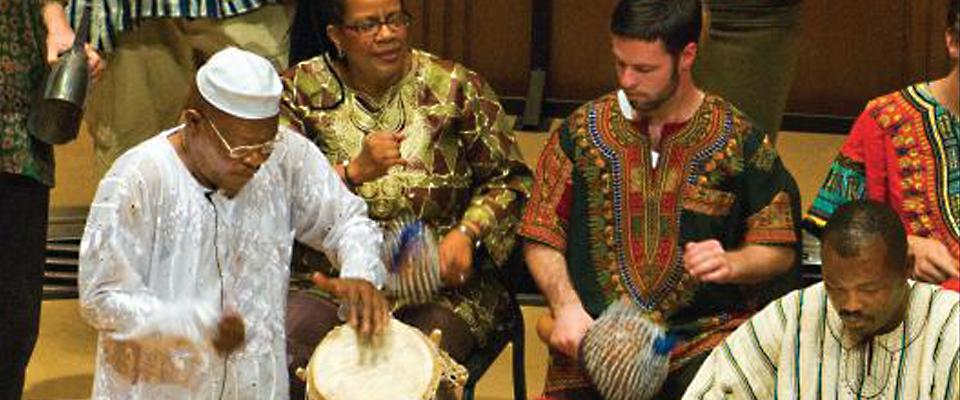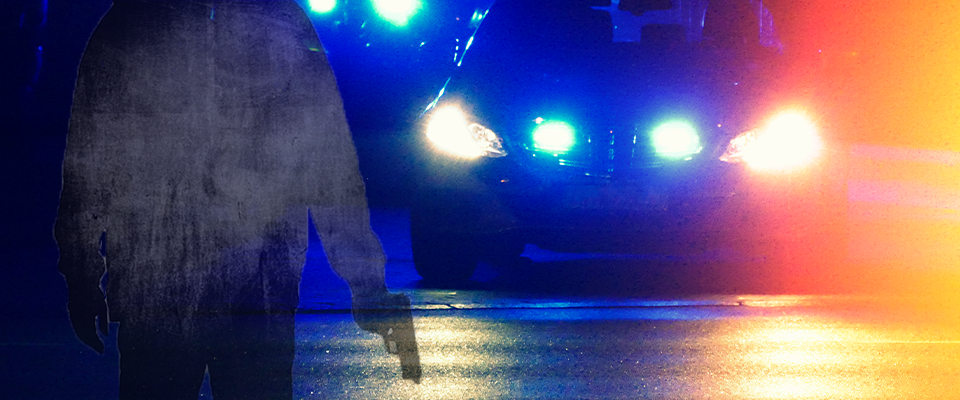Chase Livingston ’12 has been a musician all his life, and in December 2012 he released his first album, Black and White: We Are One. In large part, he says, the achievement was fueled by Berkeley professor of African music and dance, C.K. Ladzekpo (see our upcoming Summer 2013 issue for a profile of Ladzekpo).
Livingston always had a difficult time reading music, but Ladzekpo taught in the African tradition. “He’d sing and we’d copy. That’s how we learned. I fell totally in love with it,” Livingston laughs. All in all, he took Ladzekpo’s Music 148 class, also known as the West African Music and Dance Ensemble, seven times throughout his Berkeley career, which he says is not uncommon. “There’s a whole community that develops around the class and C.K.’s charisma. We’d organize jam sessions outside of class and students who graduate return as T.A.s,” he says.
Livingston cites the class as one of the main reasons he applied to study abroad at the University of Ghana—the same university Ladzekpo taught at before he came to Berkeley.
“C.K. and his assistant Kwaku also prepared me for the climate,” he says. “They even taught me the Ghanaian handshake,” which begins like any other but ends with a snap! As your hands draw away, you take the other person’s middle finger, twist, and click. It takes savvy, teamwork, and a lot of living in Ghana to perfect. “I got off the plane, and this security guard offered me his hand. I did the handshake correctly, and he thought I had been to Ghana before, but I explained that I had some good Ghanaian friends,” he recalls.
Livingston went on to meet more Ghanaians in the same manner, including Komfo Anorkye, with whom he made the album Black and White. “I was in Busua, walking on the beach during sunset and I ran into these two Rasta guys setting up their drums. We ended up playing together that night,” he explains, “I felt a connection to Anorkye. I could see that he had a great voice.”
Anorkye had been trying to become a professional musician, performing background vocals for some famous Ghanaian artists, but as a poor, uneducated Rastafarian, he was often taken advantage of. Musicians either neglected to put his name on the album or simply took credit for his voice.
When a friend offered Anorkye two free recording sessions at a studio in Accra, he asked Livingston to join him. The initial response to the recording was good so when Livingston’s study abroad program ended in May 2011 the two continued to record and write via email.
Within a year, they had nine rough songs. Livingston then returned to Ghana for two grueling weeks to finish the recordings. After months of mixing and editing, the end result was album Black and White: We Are One, currently available online.
Livingston says the title is “about where we are coming from. Anorkye and I identify as brothers. In Rasta culture, there is no such thing as ‘you and I,’ it’s ‘I and I,’ because we are all the same.” Livingston was raised Buddhist and sees many similarities between the two lifestyles. “Both Rastafarianism and Buddhism have this concept of reincarnation. We’ve lived many lives. I’ve probably been African before. Maybe at one point Anorkye was my mother.”
Meanwhile, Anorkye is back in Ghana meeting with DJs to get the album played on popular radio stations.
The multicultural roots of the album have helped it gain popularity in Ghana. “There is this fascination with Western culture in Ghana, and that has played a role in the album’s success over there,” he explains, “But the album is also different because musically, Anorkye is coming from a reggae background and I’m more blues and rock. So it’s not strictly reggae and not strictly Ghanaian high-life.” Livingston says the reception from Ghana has been good. “Anorkye says he can’t ride on tro-tros anymore. He gets noticed. But Anorkye also tends to exaggerate,” he laughs.
Livingston’s next goal is to secure a distribution deal in the United States. But his greatest hopes for the album are for his friend: “I want this album to launch Anorkye—to put him in a position where he can take care of himself.”
—Danielle Lim




















